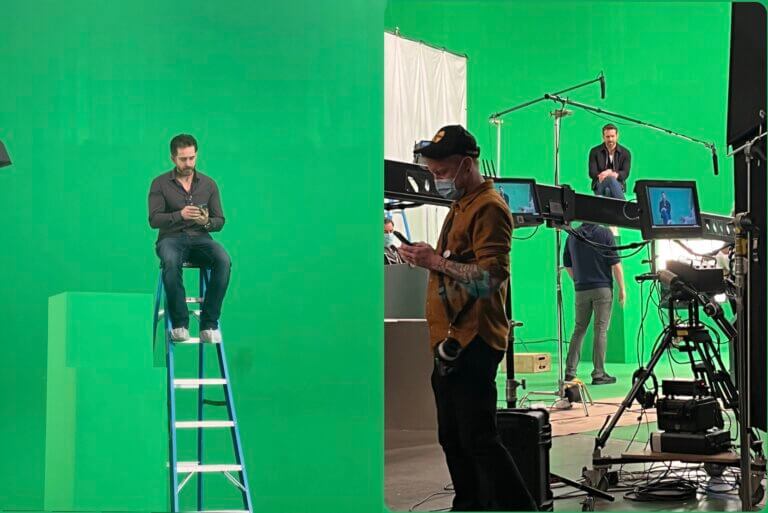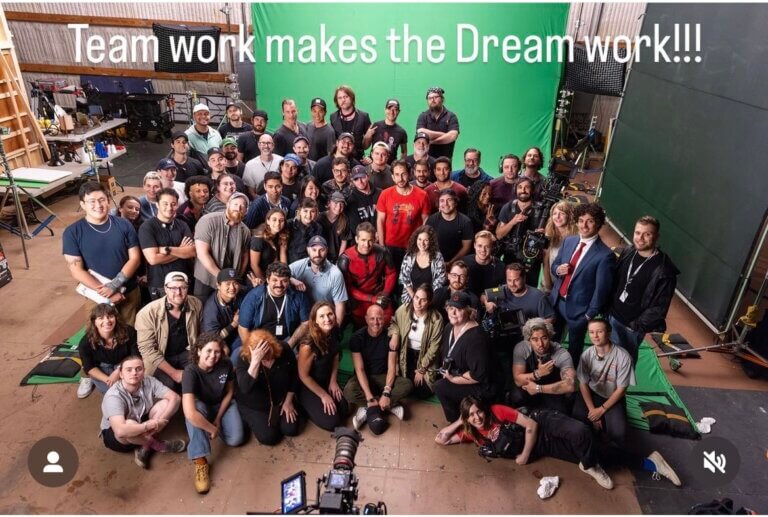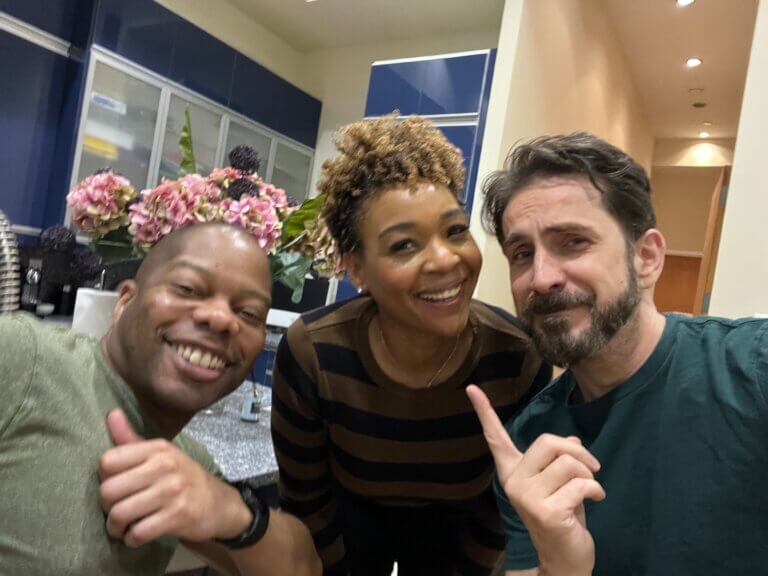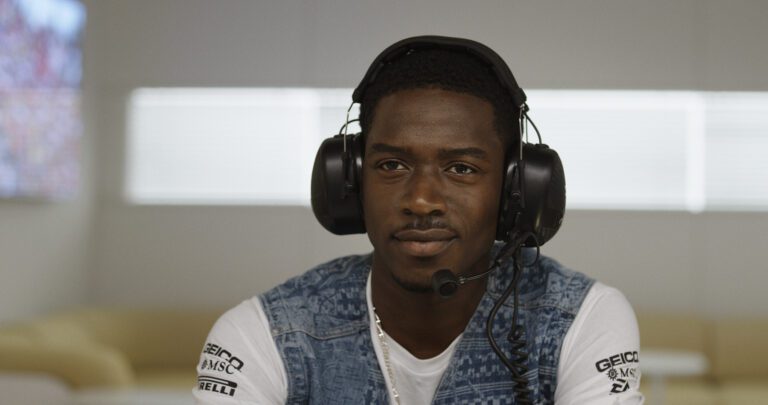Nathan Reid is a fearless force of nature. Some would think that working with Stephen A. Smith, Jason Bateman, Bradley Cooper and Ryan Reynolds would give one an ego, but not Reid. The performer is humble, bringing gratitude to every opportunity.
During the pandemic, Reid’s agency came across a stand-in gig on Casting Networks and had him submit. All he knew was that he’d be a stand-in for an A-lister until the Deadpool star walked on-set and noticed their comparable height.
Cut to two and a half years later, and that stand-in gig has been life-changing. Reid has been Ryan Reynolds’ stand-in for more than 120 commercials and advertisements, becoming close friends with members of the actor’s Maximum Effort team.
Reid shared his story with us, providing helpful insights for artists looking to solve the show business puzzle.
How did you get started as an actor?
I’m dating myself by a lot, [this is] going all the way back to when I was 19 years old. Being an artist, it kind of picks you. You don’t pick it. It’s like signing up for a life of complete uncertainty.
I was always just that person that was like, “Performing is really great!” I love the people that I meet, I love the experience of being on-set. My first national commercial was when I was 19 years old, and my last commercial was with Stephen A. Smith for ESPN. Putting them side by side, it’s like a time capsule.
What was your experience like when you first discovered Casting Networks?
I call this a good cog in the wheel. Especially if you’re talking to a new artist, they go, “How do I do this?” Casting Networks is a piece of the puzzle. Your agent is a piece of the puzzle and training is a piece of the puzzle.
Maybe 2004 … we’re talking 20 some odd years ago, I used to have to call. You had to call the number and hear all of the castings that were happening and the recording would change throughout the day. You had to call multiple times. This is [before] cell phones.
That’s like the dawn, the origin of Casting Networks. It’s been around since as long as I’ve been an artist.
Let’s say that you heard something that was right for you. You would have to call [again] and the number would always be busy because 20,000 people were trying to call that number.
When Casting Networks finally went digital, it was a huge relief because you could just submit for something and be done. It hindered actors in the olden times of what you’d be able to do, and now you can submit to 20 things at once that you’re right for.
You booked work as a stand-in and photo double for Ryan Reynolds and his Maximum Effort team through Casting Networks. How did that happen?
The ESPN commercial that I booked with Stephen A. Smith, that was my Florida agent going, “Hey, Nathan, we know you’re ridiculous at billiards. Can you put something together because we’d like to submit you on this project?” I booked that gig [because of] Casting Networks.
Lots of times with the higher-end things that Casting Networks gets, sometimes it’s coded. I remember when I booked this doubling gig for an A-lister and they wouldn’t tell you who it was or what it was for. I submitted … turned out it was doubling, standing in for Bradley Cooper.
I’ve run into Bradley multiple times. We look alike, it’s really crazy. When we worked on-set, he looked at me and was like, “This is some Black Mirror shit.” With Casting Networks, you’re throwing your hat into the mix. You’ve got to put yourself in the game in order to try to do it.
I’ve just had the fortunate opportunity to get known enough by these casting companies that it’s like, “He’s professional, he’s cool, he’s not weird.”
I’ve got to give a big shout-out to Maximum Effort because—and they know this—I’ve become friends with all the crew and the executive producers. They’ve given my son books that I read to him. It’s really become a family type of thing and it’s gone beyond the job.
Background, Inc. does a lot of background for commercials and higher-end things. They contacted me and they were like, “Nathan, you’ve worked with A-listers before, and you’re super cool, right?” And I was like, “Yeah, you can call around and ask about me.”
[These gigs] are like, show up on-set, be professional, don’t be weird. You’re not going to become friends with them. Blake Lively is not inviting me over for dinner.
They submitted me for the role through Casting Networks, and they’re like, “Cool. We have this gig for you,” and I was like, “Great.”
I didn’t even know it was for Ryan Reynolds. That’s how secretive it was.
What was it like when you turned up to set and realized it was a Ryan Reynolds gig?
I showed up to their soundstage in Brooklyn and met the whole team. This was at dawn. This was before they were shooting 19 to 22 commercials in one day—we’ll get back to that story in a second.
 Photo courtesy of Nathan Reid.
Photo courtesy of Nathan Reid.When I started with them two and a half years ago, we were at about five or six [a.m.]. I show up on-set, and I’m like, “Nice. It’s a Ryan Reynolds gig.” You’ve got the Mint Mobile set, the Aviation Gin set and one other set, I think.
This is how I think I booked the gig. I am just under 6’2″. I like to be taller so I always wear cowboy boots. I’m standing behind the Aviation Gin bar. Ryan shows up to set and starts saying hi to everybody. He comes around the bar to say hi to me and he goes, “You’re not standing on a box.”
Everyone has to stand on a box because he’s 6’3″ wearing Converse, and he was shocked that I wasn’t standing on a box to be his height so that they could do all the lighting tests and stuff. I hung out with everybody, [did the shoot] and thought it was great. Usually, you walk off the set and you think that’s the end.
Two months later, I get a call and they’re like, “Nathan, they’d like to have you back.” Two months later, three months later, two months later and it’s all systematic to the more partnerships that Ryan had, like Jack in the Box.
Now I’m showing up on-set and there’s five different sets, the crew is working like clockwork and everything is a regimented three-day setup. First day they build all the sets, second day I show up, shoot everything with them as the stand-in. Normally it’s just stand-in stuff, but then it moved into photo double stuff, which was great because I would just work.
Over the years, not only did we become friends, but it was like, “Let’s see how many commercials we can actually get through.” They started to see, like, could we hit the 22 to 23 mark in commercials for one day? After two and a half years, I believe it’s been over 125 that I’ve shot with them. Talk about a life-changing type of gig.
Booking these gigs has been… it took care of my family in the middle of the pandemic. I have said to Brooke, who’s the EP, [that] I’m very, very thankful that they have continued to call me back. They don’t owe me anything.
Every time they call me back, I have treated it like this is an honor because it’s not guaranteed. I’ll always have that attitude.
What has the full experience been like working with Ryan and the Maximum Effort team?
When you go down the list, Oren is the most amazing director ever. Charlie and Graham, their DPs and camera ops, are phenomenal. Shane Kalman is their first AD, and he’s just the nicest, kindest human being ever. Victoria and Brooke, their EPs, are darlings that have gotten my son books. I’ve sent them videos of me reading the books to him. You look at that and you go, “This went beyond a job. You know, this really kind of became a family.” They really protect their camp.
There’s a really awesome photo that’s on my Instagram, which is one of the last days that we were doing the Deadpool & Wolverine stuff. It’s the whole crew. I’m standing by Ryan and it’s this massive wide shot of everyone. Everybody continues to be asked back because they’re amazing. They protect the family.
We call it “the house that Ryan built.” It really is, and all of us have continued to love the stuff that we do and continue to work because he continues to work. It’s life-changing stuff.
 Photo courtesy of Nathan Reid.
Photo courtesy of Nathan Reid.What about Casting Networks keeps you coming back, and what features do you find to be the most helpful?
What’s really great—I found this out like literally two weeks ago—Casting Networks has a Role Tracker feature in your system that I don’t think most actors know about.
When you go onto the app, it loads up, you hit your Casting Billboard and you see all the casting calls for everything that’s happening. If you click on the three little bars in the upper right-hand side, you’ll see a button that says “Your Insights.” You click on that, and then right next to your auditions is a button that says “Role Tracker.” If you click on Role Tracker, what I dig about this is it shows you when casting has actually opened your audition.
That is so unbelievably helpful, because we sometimes are left in so much mystery. We don’t know what’s going on, so I know by scrolling through that, I know if my submission didn’t get opened—and that’s okay. There’s tens of thousands of people trying to do this—but what’s cool is that when I get called in for an audition, it goes to yellow, and when I’m in consideration for booking the job, it goes to green.
I just found that out two weeks ago. That is crazy. I’ve heard people argue that knowing that it went to green and then not booking it [is worse]. That’s subjective. Don’t you want to know that you are actually in consideration?
I think it’s super helpful. And also, [you can use it] to help you track your career.
What would you say helps somebody succeed on Casting Networks?
It’s consistency and [understanding] the casting companies. Doing stand-in work is a great way to make your [SAG-AFTRA] insurance, but you have to separate it [where you understand] that you’re not going to become a stand-in and then become a principal. Those are two completely separate things.
I think that if you are continuing to show up on sets and continuing to make these relationships, it will help you in the long run. It’s like with Jason Bateman, even though I’ve worked on his new show Black Rabbit as a stand-in, my agents and reps are still pitching me for principals that are in the casting call. If I go in for an audition and Jason’s the final word, he’s going to be like, “Dude, that’s freaking Nathan. He’s so perfect. “
There’s that little thing of familiarity to where even booking principal work, they want somebody that can do the job, be professional and not be weird. That’s it. There’s a connection in how you are looping in the work that you’re doing on Casting Networks, meeting the directors and meeting all those people, and then kind of combining them, I guess you could say.
I did a principal spot on Pretty Little Liars. The stunt coordinator was Tracey Ruggiero on that episode. Who do you think was the stunt coordinator on Gary, The Dog and Black Rabbit when I went over to do stand-in work on that show? Simple stuff like that. It’s just becoming that familiar face to where I would like Tracey to bring me in for stunt work, so seeing her in a principal spot and then seeing her in a regular sort of stand-in thing, it’s a really cool way of becoming well-known.
 Photo courtesy of Nathan Reid.
Photo courtesy of Nathan Reid.What audition tips or advice do you have that you could share with your peers?
There’s a great interview where Bryan Cranston [says], and I’m paraphrasing, “Your job is the audition. I stopped thinking if I was going to book the job and I started thinking, ‘I’m going to work.’” I’m combining Michael Keaton’s advice and Bryan Cranston’s advice because they are very similar. They both [said], “The audition is the job.” Michael Keaton said that his career changed when [he realized] the audition is the gig.
[After you’ve auditioned], you have to separate it as best as you can. I’ve done the work, and now let me go and play some basketball, play some pool or go see a great play or go see a great musical or whatever it is.
You’ve got to have that separation. Otherwise, you’re going to become jaded and you’re going to get really angry with how the industry works. “The industry is the worst game of Monopoly”—this [was said by] Matt Damon—“the worst game of Monopoly that has ever been designed.” It is not designed for you to succeed. Period.
My wife is ridiculously successful in this career. She’s in Harry Potter right now on Broadway and has 13 television credits and 10 national commercials. It’s a crazy good career. I love the term attrition. It’s like, how much hustle can you withstand? How long can you go? I think sometimes we booked half of the work that we did because we were here. We didn’t leave.
The flip to that caveat, dear God, [is] protect your circle, because if you get around a bunch of negative artists where all they’re doing is complaining about how messed up the industry is, that will bleed onto you and you will start regurgitating that.
Thinking about joining Casting Networks? Get 2 weeks free when you sign up today!
You may also like:













